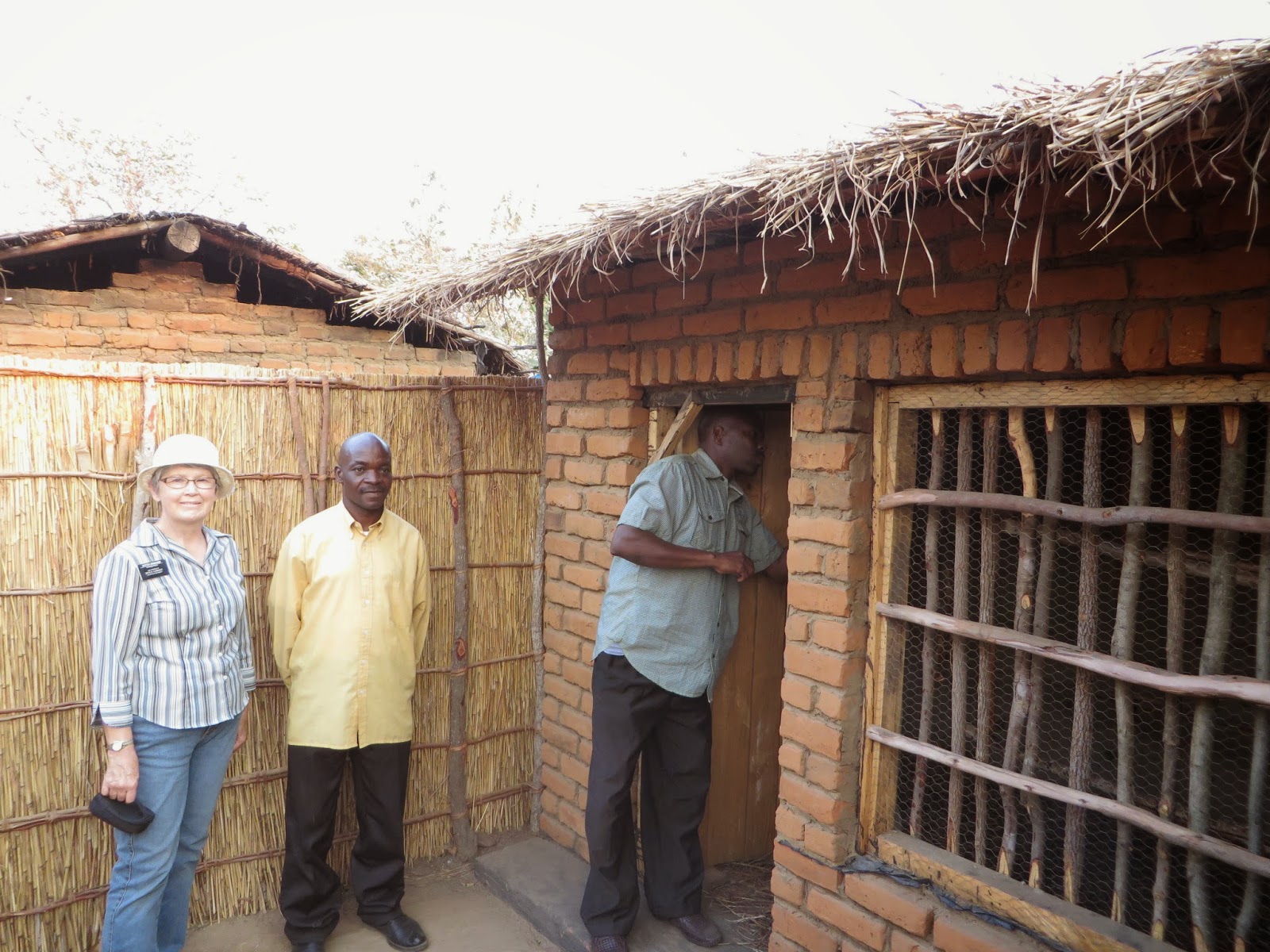The training school is in Kusungu, Malawi. The area tribal leaders choose families to participate in the project. The family moves to the farm/training center for ten months of intensive teaching and training. Below a participant of the program shows his garden of produce behind his house. They are small plots but they plant three plots one month apart and after harvesting, they have to plant something else in that plot. These small plots provide enough even for a small family to have some left over from their use to sell.
The above is the goat pen. They lock the goats up at night and the manure drops below. The manure from the goats and chickens give them the fertilizer for their gardens and fields.
Elder Bingham stops to see what these kids are doing. The little girl on the right has her baby brother on her back in a chitenge. Good way to haul a baby around.
We just had to have this picture of the cattle inside their corral. They don't spend money on expensive fencing but use what they have.
This is their chicken coop. They also teach fish farmng, maize production, soya beans, etc. They also teach them how to mill the grains and help the farmers get a start. They hold classes to teach nutrition, sanitation, cooking healthy meals, and many other things. They require the men and women to sit together as couples as they attend classes. This is something the couples don't do here in Africa is to sit with their spouse. Childcare is provided. They even have constructed large ovens to teach the women how to make and bake bread and then they sell it to the villagers. After ten months, they go back to their village and they can keep the produce they grew while in the program to help them begin farming. A representative from the school will come to the village to visit to make sure the farmers are implementing the information and skills they learned. This is really making a difference in some families lives.
We passed by these adorable little toddlers and couldn't help but grinning at them. However, I did notice very runny noses on all three. I commented later to Stanley about the progressive things we learned but then came upon these little boys with runny noses. Stanley told me that their families had just come into the training center and hadn't yet been in the classes. There was a full time hygeinist
to teach proper nutrition and how to prevent diseases and to live cleaner lives. These classes are so needed in Africa, especially in the villages.
We visited a group who has about thirty attending church there. Weston (center in red shirt) found the church online about ten years ago and wanted to know more. He gained a testimony and wants to be baptized as does most of his group. This group is so far from the center of strength for the church that we can't send missionaries there yet. These are educated people and their group continues to grow. They are patiently awaiting the day when missionaries can come and they can be joined to the Saints through the waters of Baptism. They are such an uplift. Weston had a small house but the group quickly outgrew his house. He bought a bigger house to accommodate the group. There is another group about fifteen miles from here and another group in Msungu, several hours away. We are praying for the ay these good people can be baptized.
This just shows the rape of the land. Too many trees have been cut to make charcoal out of and trees weren't replanted. Some areas aren't this bad but the bigger part of Zambia and Malawi that we have seen have had their trees cut down to be burned in the charcoal cookers.
A few trees are left here but the older trees are very sparse. We stopped in an area where trees were being logged out. In the northern part of Malawi, there are plantations of rubber trees and conifer trees. Where the trees were harvested, thousands have been replanted. These trees are being managed but these trees are not indigenous to the country. However, they show that they can be successfully grown and harvested here.
We stopped for a rest break and while we were stretching our legs, we saw these three women coming. It was unbelievable the loads they had on their heads. They would walk for quite a ways then drop the logs to catch their breath, then pick them up again and hoist them onto their heads make their way to their village. These women didn't dawdle along the way either. They were moving. I had to hurry to keep up with them to get their pictures.
Jotham, on the right, is the leader of a group in Msungu who also want missionaries and to be baptized but they are many hours from the nearest center of the church. We pray that someday they will get their wish.
Stanley in front of a stand of a tree plantation in northern Malawi.



















